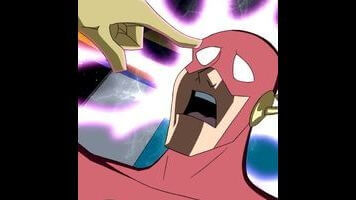Justice League Unlimited: “The Great Brain Robbery”

Justice League Unlimited, “The Great Brain Robbery” (season 3, episode 8; originally aired March 4, 2006)
After reviewing Justice League and Justice League Unlimited for four and a half seasons, I’ve come to realize that humor is what makes these two series so fresh and enjoyable. No matter how dire the situations get, there’s always room for a little levity, which the writers expertly use to diffuse tension and amplify the dramatic elements of the story. The use of comedy makes everything more fun, especially when combined with the lively, exaggerated DCAU house style. At a time when superhero comics embraced darker narratives and visuals, these cartoons stood out by keeping everything kid-friendly, but the writers were still very careful to keep the product appealing to adult fans of DC’s heroes, incorporating more mature themes and the occasional innuendo into the scripts.
One of the comic highlights of these five seasons is “The Great Brain Robbery,” an episode that intensifies the conflict between the Justice League and the Legion of Doom by switching the minds of The Flash and Lex Luthor. After weeks of speculation, the League finally gets a good look at their opponents when Flash finds himself behind enemy lines in Luthor’s body, and Lex gets to show how much of a threat he is by using Flash’s speed to single-handedly take out his superhero opponents. But the thing that makes this episode so remarkable is the humor, taking advantage of the Freaky Friday scenario to deliver some of the series’ funniest moments.
“The Great Brain Robbery” is a showcase for Clancy Brown and Michael Rosenbaum’s vocal ability, giving them the opportunity to dig deep into two different characters that are polar opposites in terms of personality. Clancy Brown’s work as Lex Luthor has always been one of the strongest performances in the DCAU, but he gets to explore a completely different part of his vocal range when he plays Flash as Lex, elevating his pitch and delivering his lines with a more playful energy. Brown has the more challenging material of the two actors, but he has no problem capturing the awkward discomfort of Flash attempting to act like Luthor.
Brown really commits to Wally’s attitude, making the character’s behavior even more hilarious because the audience can still hear Lex’s voice underneath. The Flash as Lex storyline is where writers Dwayne McDuffie and Matt Wayne lean into the comedy angle of this scenario, playing with how Wally’s personality contrasts with what the audience knows about Lex Luthor. As we see in this episode’s opening scene (and have seen many times in the past), Luthor is an intense, very serious supervillain that doesn’t abide foolishness, but Wally is all about foolishness. It’s what makes him so lovable. He jokes around and makes himself look dumb in front of all the ladies and generally keeps things light and bubbly, which makes it very difficult for him to assume Lex’s persona without arousing suspicion.
Watching Wally fumble around in Lex’s shoes leads to some incredibly amusing scenes, and after both “Flash And Substance” and “The Great Brain Robbery,” this show’s creative team is fully forgiven for keeping Flash on the sidelines for the entire first season of JLU. Flash as Lex gets more attention than Lex as Flash (whose story is more action-centric), and he takes part in a number of situations that deliver big laughs. The sequence where Wally needs to address the entire Legion as their leader uses humor to build suspense, forcing the speedster to think fast if he’s going to make this act work. He gives in to Tala’s seduction to introduce some of that aforementioned innuendo, and when Lex returns to his body at the end of the episode, the sorceress is disappointed that she’s lost Flash’s attentive affection. But the best Flash as Lex moment takes place in the bathroom, where he has this outstanding exchange with Dr. Polaris:
 Keep scrolling for more great stories.
Keep scrolling for more great stories.
